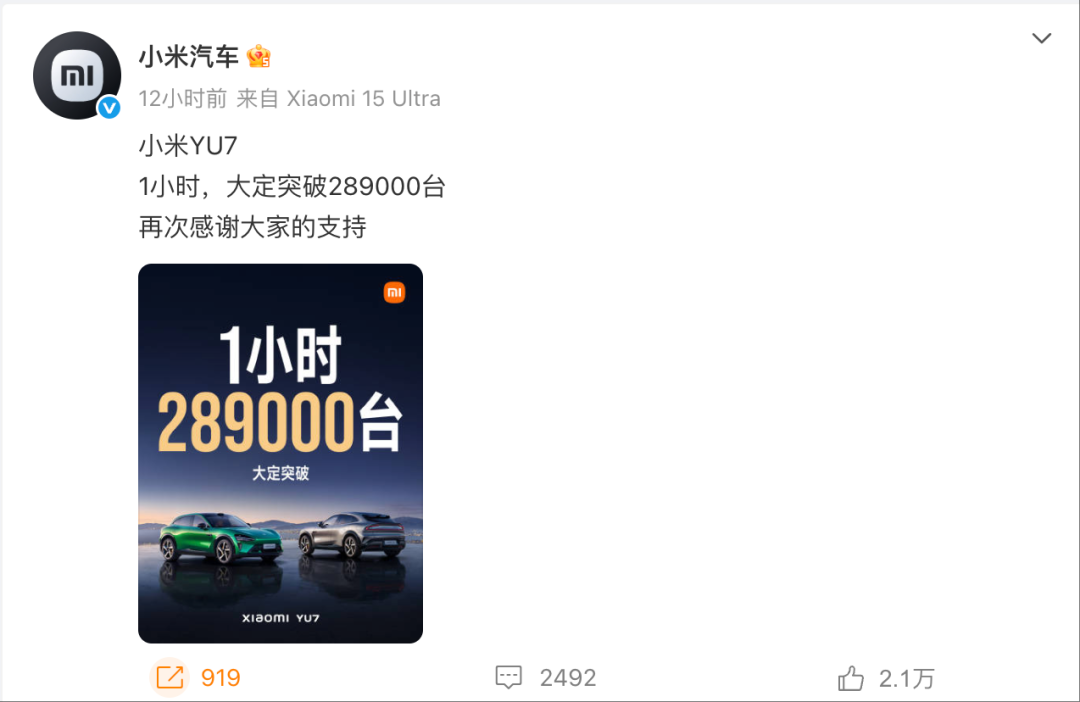["Industry In-depth Research] Xiaomi YU7 Outshines Mobile Phones and AI Glasses: Can Lei Jun Rival Musk?
![]() 06/30 2025
06/30 2025
![]() 762
762

Author | Yuan Fang
Learn More Financial Information | BT Financial Data Hub
This article is 3,964 words long and is expected to take 9 minutes to read
Xiaomi's product launches have become an annual event for tech enthusiasts.
On the evening of June 26, Xiaomi Automobile unveiled its first SUV model, the Xiaomi YU7, available in three versions: Standard, Pro, and Max, priced at 253,500 yuan, 279,900 yuan, and 329,900 yuan, respectively. Shortly after pre-orders opened at 10 PM on the same day, Xiaomi Automobile reported remarkable success: The Xiaomi YU7 received over 200,000 orders within 3 minutes and surpassed 289,000 orders within 1 hour.

Xiaomi's first SUV model, the YU7, created a sales phenomenon in China's automotive industry during its June 26, 2025 launch event, securing over 200,000 orders within 3 minutes and surging to 289,000 within 1 hour, locking in revenue of approximately 57.8 billion yuan, equivalent to 1.8 times Xiaomi Group's total automotive revenue for 2024.
Xiaomi also introduced the Xiaomi Flip2 foldable phone, the Xiaomi Pad 7S Pro equipped with the Xuanjie O1 flagship chip, and Xiaomi AI Glasses, described as a "personal smart device for the next era." However, the performance of the YU7 overshadowed the other hardware products released simultaneously, such as the Xiaomi Flip2 foldable phone and Xiaomi Pad 7S Pro.
These products, once Xiaomi's core business, were deemed to have a "limited presence" at the launch event, overshadowed by the Xiaomi YU7. Some believe that Lei Jun is not only unbothered by this but should be relieved, as Xiaomi's automotive project was initiated due to the slowing growth of its mobile phone business, aiming to replace it as the second growth curve.
Should Lei Jun be anxious or relieved that the automotive business overshadows the mobile phone business?
1. From Mobile Phone Growth Anxiety to Automotive Business Explosion
Xiaomi Group's development journey serves as a textbook for the transformation of Chinese tech enterprises. In 2021, when the global smartphone market reached its peak and Xiaomi's mobile phone business growth slowed to single digits, Lei Jun made the most controversial yet forward-looking decision in the company's history – to venture into the field of smart electric vehicles.
This decision was underpinned by a clear understanding of the growth bottleneck in the mobile phone industry and a forward-looking strategy for the future tech ecosystem. As Lei Jun stated in an internal letter at the time, "Xiaomi needs a second growth curve, and automobiles are the biggest smart terminals of the next decade." Today, the extraordinary success of the YU7 validates the foresight of this strategy.
From a financial perspective, Xiaomi's automotive business, although still in the investment phase, is demonstrating rapid growth momentum. In 2024, Xiaomi's automotive business revenue reached 32.1 billion yuan, while the YU7 generated locked-in revenue of 57.8 billion yuan within one hour, exceeding 1.8 times the total revenue of the automotive business from the previous year. Notably, Xiaomi's automotive business gross margin has been improving quarter by quarter, from 15.4% in Q2 2024 to 20.4% in Q4, approaching NIO's gross margin of 20.53% for the same period. This growth quality indicates that Xiaomi Automobile is not relying on subsidies or low-price strategies to gain market share but is winning consumer recognition through genuine product strength.
The challenge of premiumization in the mobile phone business is another crucial factor prompting Xiaomi to accelerate its transformation towards automobiles. Although sales of the Xiaomi 14 series increased by 80% compared to the previous generation, capturing a 24.3% market share in the 4,000-5,000 yuan price segment, the gross margin of the smartphone business fell from 14.6% at the end of 2023 to 12.6% at the end of 2024. With Huawei returning to the 5G market and Apple continuing to explore the mid-range market, the mobile phone business alone cannot support Xiaomi's trillion-yuan market value dream. The timely success of the YU7 has opened up broader growth prospects for Xiaomi, which is also the fundamental reason why Lei Jun should feel relieved that the mobile phone products were overshadowed – the automotive business is becoming Xiaomi Group's true "second engine".
From a production capacity planning perspective, Xiaomi Automobile's Yizhuang Factory in Beijing has an annual capacity of 150,000 units in Phase I, with an additional 150,000 units expected in Phase II by mid-2025. However, the YU7 received nearly 300,000 orders in a single day, far exceeding the current production capacity of the factory. This "sweet problem" reflects that the market demand for the automotive business far exceeds expectations. Lei Jun's excitement was evident: "All our car owners, together with Xiaomi, have created a miracle in the history of China's industry." This miracle is not only reflected in the sales figures but also in Xiaomi's successful leap from consumer electronics to high-end manufacturing.
2. From "Cost-Effective" Label to Premiumization
The remarkable success of the Xiaomi YU7 marks a qualitative leap in Xiaomi's brand image. For a long time, Xiaomi has been labeled as "cost-effective" by the market, which helped it quickly capture market share but also restricted its brand premium and profitability. With a price range of 253,500-329,900 yuan, the YU7's unprecedented success in the high-end electric SUV market completely shattered the stereotype that Xiaomi "can only make low-priced products," achieving a significant upgrade in brand value.
From a product positioning perspective, the YU7 directly competes with Tesla Model Y and entry-level pure electric SUVs from BBA but surpasses them in terms of configuration parameters: the Standard version has a range of 835 kilometers (Model Y Standard version is 593 kilometers), the all-wheel drive version accelerates from 0 to 100 km/h in 3.23 seconds, and all versions come standard with LiDAR and NVIDIA Thor chips (700 TOPS computing power). This "top-tier popularization" product strategy – bringing luxury car configurations from the 500,000 yuan segment down to the 250,000 yuan segment – not only redefines industry value standards but also successfully establishes Xiaomi's brand image as "technologically advanced." Lei Jun confidently declared at the launch event, "YU7 is not an ordinary SUV, it is a very unique SUV." This confidence stems from substantial breakthroughs in product strength.
Changes in user structure best reflect the effectiveness of Xiaomi's brand upgrade. Data shows that among Xiaomi SU7 series car buyers, 29% are BBA users, and 52.5% are Apple users. The influx of these traditional high-end brand users has significantly improved the quality and spending power of Xiaomi's overall user base. With its higher positioning and more luxurious configuration, the YU7 is expected to further expand its penetration in high-net-worth user groups. This optimization of user structure will generate cross-selling effects, feeding back into the premiumization process of traditional businesses such as mobile phones – high-end users of the YU7 are more likely to choose Xiaomi's high-end mobile phone products, forming a closed loop of consumption upgrade within the ecosystem.
From a brand asset perspective, the success of the YU7 greatly enriches the connotation of Xiaomi's brand. Previously, Xiaomi's brand associations mainly focused on dimensions such as "young," "cost-effective," and "internet"; now, high-end attributes such as "technology," "luxury," and "performance" are rapidly integrating into Xiaomi's brand genes. This accumulation of brand assets has long-term value and will provide endorsement for the premiumization of Xiaomi's entire product category. Notably, the popularity of the YU7 did not squeeze the market space of SU7 as expected – new orders for SU7 have increased from the expected 10,000 units per month to 13,000-14,000 units, indicating that Xiaomi Automobile has formed a differentiated product matrix capable of meeting the needs of different market segments simultaneously.
The upgrade of Lei Jun's personal IP is also an important part of enhancing brand value. As an iconic figure in China's Internet era, Lei Jun has successfully transformed from the protagonist of the "Are you OK" meme to a tech entrepreneur who can be compared with Musk. His confident performance at the YU7 launch event, benchmarking against Tesla, and his bold declaration on social media of "creating a miracle in the history of China's industry" are strengthening his image as the spokesperson for China's high-end manufacturing. This upgrade of his personal IP complements Xiaomi's brand premiumization, jointly constituting intangible assets for Xiaomi's assault on the status of global tech giants.
3. Revaluation from a Hardware Company to an Ecosystem Giant
The sales phenomenon of the YU7 has sparked a strong reaction in the capital market, directly driving up Xiaomi Group's market value. The day after the launch event, Xiaomi's ADR rose by more than 10% in a single day, with its market value surging by over HK$50 billion. This market response is not only recognition of the success of a single product but also a revaluation of Xiaomi's overall business model upgrade – investors are reassessing Xiaomi's investment value based on the standards of an ecosystem technology company rather than a hardware manufacturer.
From a valuation logic perspective, the capital market's perception of Xiaomi is undergoing a fundamental transformation. Traditional hardware companies, due to low growth visibility and limited profit margins, typically receive a P/E ratio of 10-15 times; however, ecosystem technology companies, with stronger user stickiness and broader monetization space, often receive a valuation multiple of 20-30 times or even higher. Before the launch of the YU7, Xiaomi's market value was approximately HK$1.4 trillion, corresponding to a P/E ratio of approximately 40 times based on its adjusted net profit of HK$27.2 billion for 2024, which already reflected partial market recognition of its ecosystem strategy. With the YU7 proving that the automotive business can scale and generate synergies, Xiaomi's valuation center is expected to shift further upwards.
The improvement in cash flow and financing capabilities is another reason for the capital market's optimism. As of June 30, 2024, Xiaomi's closing cash and cash equivalents were HK$39.335 billion, an increase of nearly HK$8 billion year-on-year. This abundant cash flow provides a guarantee for the continuous investment in the automotive business, reducing the need for external financing. More importantly, the overwhelming orders for the YU7 will significantly improve Xiaomi Automobile's financial situation – based on locked-in revenue of HK$57.8 billion, even considering a loss of HK$45,300 per vehicle, the 289,000 orders will only generate a loss of approximately HK$13 billion, far lower than previous market expectations. With economies of scale emerging, Xiaomi Automobile is expected to achieve break-even in 2025, which will completely change investors' perception of it as a "money-burning" business.
From the perspective of business structure optimization, the high growth of the automotive business is changing Xiaomi's revenue composition. In Q4 2024, Xiaomi's automotive business revenue accounted for 15.3% of the group's total revenue; the HK$57.8 billion revenue generated by the YU7 within one hour is equivalent to 15.8% of Xiaomi Group's total revenue of HK$365.906 billion for 2024. If we add SU7 sales, the automotive business is likely to contribute more than 30% of Xiaomi's revenue in 2025, becoming a true second pillar. This diversification of the business structure reduces the company's dependence on the mobile phone business alone and enhances its anti-risk capability, a development trend welcomed by investors.
The widespread upward revision of analyst expectations reflects institutional investors' reassessment of Xiaomi. Morgan Stanley raised Xiaomi's target price from HK$28 to HK$35 after the YU7 launch, believing that "the success of the automotive business proves Xiaomi's technological accumulation and brand premium ability"; Goldman Sachs pointed out that "Xiaomi's people-car-home ecosystem has formed a closed loop and will enjoy a higher valuation premium." Among domestic securities firms, CICC predicts that Xiaomi's automotive sales are expected to exceed 500,000 units in 2025, driving overall revenue to exceed HK$500 billion. These optimistic expectations have jointly driven Xiaomi's share price to continue rising, with gains of over 70% since 2025.
It is worth noting that the success of the YU7 has also had a spillover effect on the entire new energy vehicle industry chain. Xiaomi Automobile concept stocks have been active in the A-share market, especially its domestic supply chain enterprises, which have been sought after by investors. Lei Jun revealed that through self-developed three-electric systems and large-scale adoption of domestic supply chains, Xiaomi has successfully reduced the cost of luxury car components by 40%. This deep integration capability of the supply chain not only enhances Xiaomi's own competitiveness but also contributes to the upgrading of China's automotive industry chain, further strengthening investors' confidence in Xiaomi's long-term value.
In the long run, the capital market's focus on Xiaomi has shifted from "how many mobile phones have been sold" to "how much value has been created through ecosystem synergies." This is precisely the transformation that Lei Jun welcomes – when investors assess Xiaomi based on the standards of an ecosystem company rather than a hardware manufacturer, its valuation ceiling will be significantly raised. The sales phenomenon of the YU7 has accelerated this cognitive transformation process, opening up space for Xiaomi's market value growth over the next three years.
In sum, the influence of YU7 extends far beyond that of a mere popular product. It signifies a profound transformation of the traditional automobile industry through internet thinking and heralds a novel trajectory for the premiumization of Chinese automobile brands. As Lei Jun aptly noted, YU7 "is not an ordinary SUV"; its success is not a mere coincidental sales feat, but the natural culmination of Xiaomi's long-term strategic vision.
In this context, the prominence of non-mobile phone products at the launch event is a testament to Xiaomi's successful transformation. The company has evolved from being a mobile-centric enterprise to an ecosystem technology giant, encompassing all facets of people's lives, from their phones to their cars and homes.
This article is an original work by BT Finance and is subject to copyright protection. Unauthorized use, copying, distribution, or adaptation is strictly prohibited and may lead to legal consequences.




